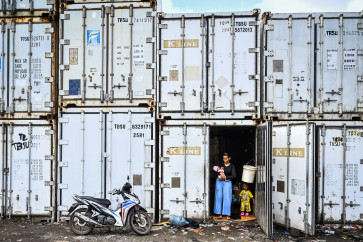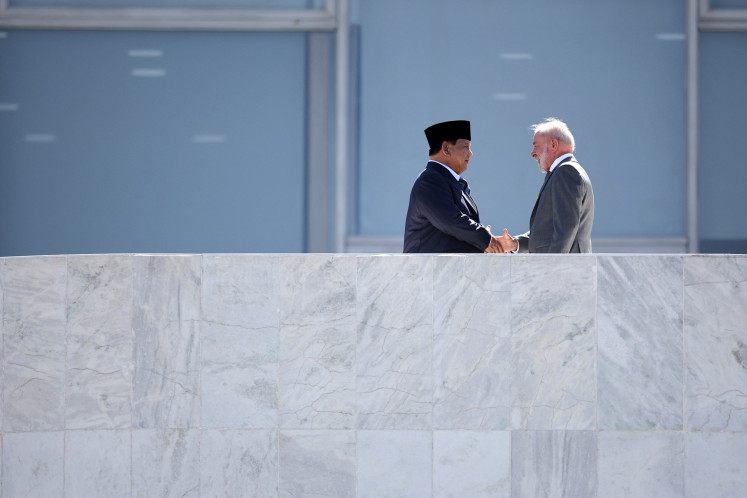Popular Reads
Top Results
Can't find what you're looking for?
View all search resultsPopular Reads
Top Results
Can't find what you're looking for?
View all search resultsRenewing support for renewable energy
Indonesia is at a crossroads
Change text size
Gift Premium Articles
to Anyone
I
ndonesia is at a crossroads. With the impressive rate of growth of its economy - leading to a dramatic increase in the level of energy consumption - and its ambition to reduce its greenhouse gas (GHG) emissions, it needs to come up with a way to reduce its reliance on carbon-fueled energy.
According to the World Energy Outlook 2009 published by the International Energy Agency (IEA), Indonesia is the largest energy producer and consumer in the region, the world's leading thermal coal exporter, a substantial liquefied natural gas (LNG) exporter, and until 2004 was a net oil exporter.
If no new oil reserves are found, and with the increasing demand for energy, scientists expect Indonesia will be a significant oil importing country within less than two decades.
By 2030, Indonesia will remain an exporter of natural gas and coal, but will import 1.3 million barrels of oil per day.
Energy demand will increase in line with regional economic development and population growth.
At present, around 65 percent of the population have access to electricity. But in rural areas, 74 million people remain unconnected to the network.
As a result, Indonesia is expected to provide its own supply of energy to avoid energy security issues.
According to the IEA Reference Scenario, Indonesia accounts for 36 percent of the incremental energy demand in ASEAN to 2030.
With the high price of oil and the target to reduce emissions, Indonesia needs to provide an alternative source of energy to meet this demand.
Coal has been seen as one of the significant sources to substitute for oil to satisfy Indonesia's primary energy development, especially under the first phase of the 10,000 MW of capacity added by 2013 - mostly through coal-fired plants.
However, the use of coal for power plants has major environmental impacts, namely smog, acid rain, significant GHG emissions that cause global warming, and air pollution.
On the other hand, Indonesia possesses a variety of other energy resources. These include natural gas and renewable energy sources such as geothermal, solar, micro-hydro, wind and bio-energy.
It will be impossible to diversify energy sources, address the escalating concern over environmental issues, and reduce dependency on conventional energy resources if there is no serious support for or investment in renewable energy.
The National Council on Climate Change recommends the conversion from coal and petroleum-based fuels to renewable energy sources to reduce emissions. The government's general energy policy also advocates the diversification of energy sources.
Nonetheless, promoting the development of renewable resources over the past several years has progressed very slowly.
Energy and Mineral Resources Ministry statistics show that at present renewable energy (hydropower, geothermal and biomass) accounts for only 3.4 percent of total potential reserves.
This is perhaps because there are no clear policies, incentives or pricing plans to encourage investment in renewable energy, or promotion of schemes to develop renewable energy concurrently to displace high-carbon coal with low-carbon gas as a "bridging fuel".
Lets take a look at geothermal energy.
Despite Indonesia possessing the world's largest reserves of geothermal energy, it hasn't made much progress using them. Over the last two decades, less than 4 percent of Indonesia's geothermal potential has been developed.
Pricing of those energy sources is one of the main obstacles in the development of geothermal energy in Indonesia. Geothermal energy needs to be competitive with other energy sources, and at the same time offer developers an attractive rate of return.
The geothermal industry argues that prices could be more competitive if upstream and downstream activities could be integrated, with value added tax (VAT) applied only to sales of electricity. A significant factor affecting the price of geothermal energy is the 34-percent tax rate applied to electricity rates.
The government's recent introduction of a ministerial decree on the benchmarking of prices of geothermal electricity sold to PLN (the state-owned electricity company) may provide a breath of fresh air.
Other obstacles that need to be addressed include high fossil fuel subsidies, inadequate legal and institutional frameworks to promote the development and utilization of renewable energy that result in the unpredictability of the industry and bias for fossil fuels, and higher upfront costs compared to conventional energy.
This is why the reduction of subsidies allocated for fossil fuels is still necessary to stimulate further use of alternative renewable energy resources.
The development of renewable energy has also been generally smaller in scale compared to fossil-fuel based projects. Hence, the relative transaction costs are higher, which impedes small investors from opting for renewable energy and discourages government officials from supporting such projects.
It is clear that for Indonesia to achieve its aspiration to reduce greenhouse emissions while ensuring energy supplies for future generations, the barriers mentioned above will have to be addressed seriously.
A comprehensive mechanism framed by relevant government regulatory agencies is required to ensure necessary support for the development of renewable energy.
It is time to for this country get going, not just with small test pro-jects of renewable energy but with full-scale support and programs.
The writer is the program director of climate & energy at WWF-Indonesia, and adjunct lecturer at Paramadina Graduate School of Diplomacy. He can be reached at fardiansyah@wwf.or.id










